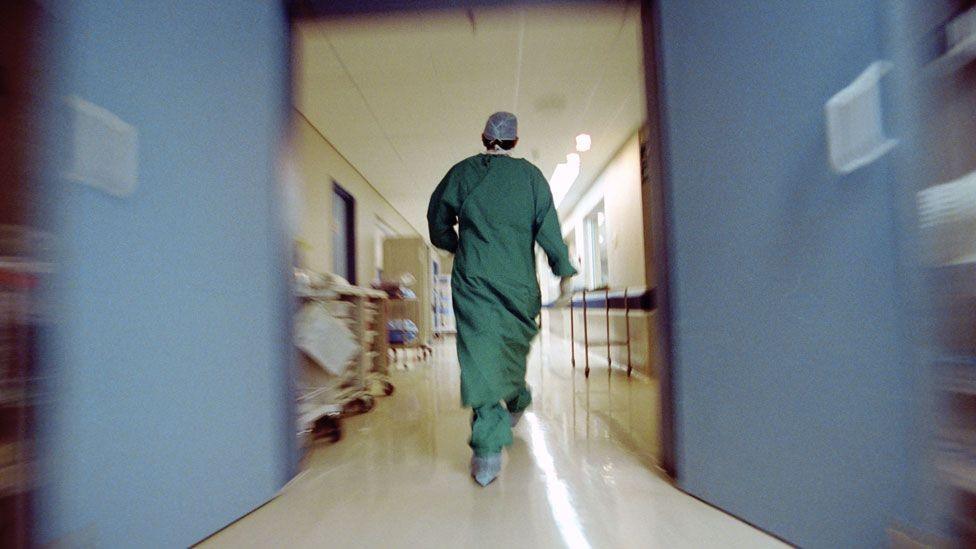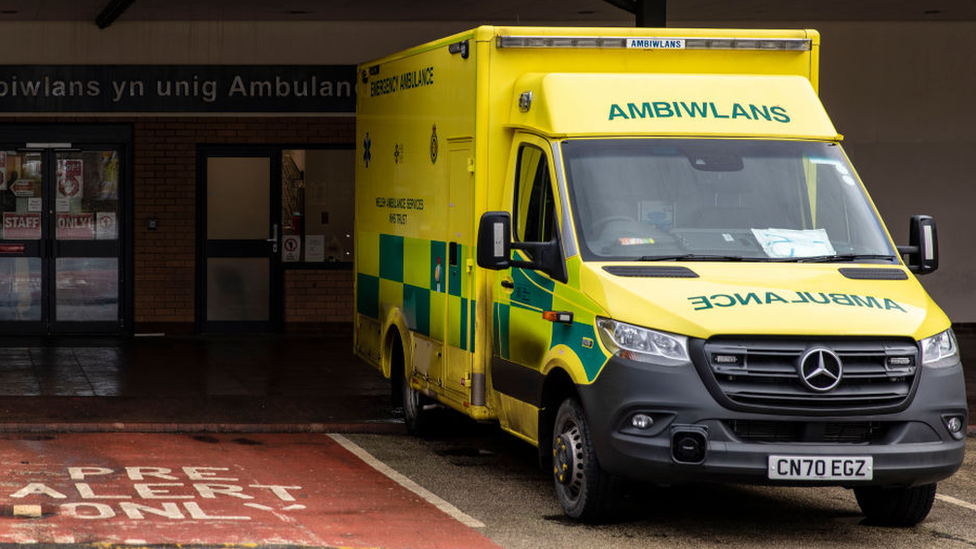Covid-19: Waiting lists now seven times pre-pandemic level
- Published

There are more than 40,000 more patients waiting to be diagnosed than a year ago
The number of people waiting more than nine months for hospital treatment is now nearly seven times higher than at the start of the Covid-19 pandemic.
More than 205,000 patients - 39% - had been waiting that long in October since receiving a hospital referral letter.
It comes as new daily figures show hospital admissions with Covid-19 are at their highest point since mid-May.
The Welsh Government said coronavirus was having a "major impact" on delivering services.
The latest monthly NHS Wales figures on treatment and performance, external showed the 205,047 waiting in October was the highest since current records began in 2011.
Most non-urgent treatment was postponed to prepare for the first coronavirus wave.
The Welsh NHS has since been trying to start non-emergency treatments again and continue as far as possible during the second wave.
In November NHS Wales chief executive Andrew Goodall warned that it would take "a number of years" for waiting times to recover to levels before the pandemic.
He said last month that patients had been "shifted more to the end of the list as we've had to priorities urgent and emergency cases".
The latest figures show that the median waiting time to start treatment had been about 10 weeks, between 2013 and February 2020. But the pandemic saw the median waiting time increase to more than 29 weeks in October.
The Welsh Government target is that no patient waits more than 36 weeks for treatment after referral, and that 95% should wait less than 26 weeks.
The figures also show a fall in the percentage of the most serious calls to ambulances in Wales receiving a response within the target time of eight minutes.
November was the fourth month in a row the target of 65% was missed.
New experimental measures of performance
64,127patients seen across A&E units
15minutes average wait, time to triage
60minutes average wait, time to see clinician
44.1%no follow-up required
24.7%patient admitted to hospital
Alongside it, NHS Wales also published for the second time its experimental format for A&E figures.
This showed the median waiting time to see a clinician had risen slightly to 60 minutes.
The overall figures also revealed that 4,766 patients waited more than 12 hours in A&E, despite a fall in those attending and doctors warned it was "incompatible" to manage alongside Covid.
Dr Suresh Pillai, vice president of Royal College of Emergency Medicine said: "In Wales, long waits and overcrowding have stubbornly persisted in our emergency departments for some time now.
"We anticipate the pressures that come with winter will be unlike anything we have experienced before."


Meanwhile, daily NHS Wales figures showed hospital admissions of Covid-19 patients are at the highest levels since mid-May.
The seven-day average is running at 114, according to NHS Wales.
This is up by 25 patients a day on the previous week's average and accounts for about 16% of all hospital admissions.
Patients with Covid make up nearly a third of all hospital patients at Welsh hospitals.

Hospitalisations are once again at record levels with Covid patients - 2,422 on Tuesday.
The number of recovering patients is also at its highest levels yet. These are patients no longer testing positive but still too sick from the effects of the virus to be discharged.
Numbers of Covid patients have risen over the week in all areas, while Aneurin Bevan University Health Board has the most patients - 645 - which means 48% of all patients in the health board have Covid-19.
The number of patients in critical care or on intensive care (107) is now the highest since the end of April.
Richard Johnson, Welsh director of the Royal College of Surgeons, said the figures on waiting times showed the "devastating impact" Covid was having and he warned of an "incredibly challenging winter".
"With the number of Covid infections rising again, we are seeing planned surgery being cancelled in some parts of Wales once again. This will only add to the enormous backlog of operations," he said.
"It is crucial we establish a clear plan for the recovery of surgery in Wales to avoid people waiting many months in pain and suffering for an operation."
Conservative health spokesman Andrew RT Davies MS said the pandemic had "shone a spotlight" on some NHS issues and had gone on to make them worse.
'Sickness rates'
"The Welsh Government needs a plan on how they are going to bring waiting times down rapidly, when hopefully the Covid vaccine offers some respite to the immense challenges our NHS staff are facing," he added.
The Welsh Government said every aspect of healthcare has been affected by coronavirus, which was having a major impact on delivering services and had lead to a significant rise in waiting times for elective treatment.
The spokesperson added: "The Welsh Ambulance Service has been affected by the extra time it takes for paramedics to put on the required level of PPE, as well as the need to deep clean vehicles after call outs.
"Sickness rates have also increased over the past three months - NHS staff are not immune to coronavirus or the need to self-isolate - which is having a further impact on the NHS' ability to deliver services and will impact on performance.
"To help support the NHS we have made an additional £30m available to support urgent and emergency care services and increase resilience over the remainder of this financial year.
"The health minister has also recently set out an operational framework that enables health boards to take action to clinically prioritise activity and ensure treatment is delivered for those in most clinical need while Covid pressures are particularly acute.
"We moved to alert level four to help slow the spread of coronavirus and protect people's health. We need everyone's help to help protect our NHS this winter."
- Published8 February 2021

- Published28 May 2024
